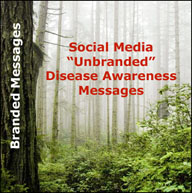Vol. 9, No. 8: OCTOBER 2010 – EXECUTIVE SUMMARY
CONTENTS
Up Front
Articles
- Integration of Custom Media into the Marketing Mix
- Digital Pharma Is Alive and Well in Europe!
- Getting It Right in Emerging Markets
Blog Commentaries
- Did J&J Troll Social Media Sites to Ensure Its Motrin “Recall” was a Secret?
- How FDA Warnings & DTC Advertising Increase Sales of Sexual Enhancement Dietary Supplements
- Markets as Conversations: Can You Have a Discussion with “Psoriasis 360” on Facebook?
- Pre-Emptive Medication Adherence. Is Pre-Emptive DTC Next?
- Pharma Brands Benefit from “Mack Attacks” Say Attendees at DigiPharma EU
- Avandia and Janet Woodcock, the Next FDA Commissioner
Article Summaries Up Front
Social Media and the Limitations of Disease Awareness Campaigns
 I am impressed by all the pioneering social media campaigns that have been created by European pharma companies.
I am impressed by all the pioneering social media campaigns that have been created by European pharma companies.
Of course, all these campaigns are “unbranded” disease awareness initiatives. It’s as if the ban on DTC allowed EU marketers to see the forest for the trees.
But disease awareness (DA) campaigns have limitations that even well-executed social media campaigns cannot overcome.
Read on…this article is AVAILABLE NOW here:
www.news.pharma-mkting.com/PMNews_98_UpFront.pdf
Integration of Custom Media into the Marketing Mix
The American Diabetes Association Makes It Easy!
 Which do patients, caregivers, and healthcare professionals prefer: custom educational materials (“custom media”) or advertising? It may not surprise you to learn that 3 out of 4 respondents in a study by Roper Public Affairs for the Custom Publishing Council agreed that getting information from an interesting collection of articles is more appealing than getting information from advertisements.
Which do patients, caregivers, and healthcare professionals prefer: custom educational materials (“custom media”) or advertising? It may not surprise you to learn that 3 out of 4 respondents in a study by Roper Public Affairs for the Custom Publishing Council agreed that getting information from an interesting collection of articles is more appealing than getting information from advertisements.
Of course, not all custom media are up to the task. What you need is information that is specifically tailored to the audience you are trying to reach and that is created by a well-known and respected educational partner. Pharma marketers are increasingly turning to patient advocacy groups as educational partners in order to reach their members and leverage their content. One of the most premier advocacy organizations in the U.S. is the American Diabetes Association®: (ADA).
This article summarizes a discussion with Abraham Ogden, the Director of Book Publications for the American Diabetes Association, about integrating ADA’s custom publications into the pharma marketing mix.
Topic headings include:
- Diabetes Affects Millions of Americans
- ADA’s Custom Publication Program
- Authoratative Brand
- Repurposing Content Keeps Prices Competitive
- Diabetes 911
- Custom ADA Publications for Consumers
- Customization is Key
- Quick Turnaround
- What About Product Ads?
- Custom ADA Publications for Professionals
- Compliance with PhRMA Code
- New Media Options
Subscribe Now and download this article FREE (offer ends November 24, 2010). Or pay-per-reprint without subscribing below: Order and pay for this reprint now using your credit card…
ONLY $4.95Download PDF file immediately after paying:
Digital Pharma Is Alive and Well in Europe!
Report from DigiPharm Europe 2010
 From September 28 through October 1, 2010, over 200 conference attendees of the DigiPharm EU conference in London, heard from industry experts including marketing specialists from Lundbeck, Janssen-Cilag, GSK, Roche, Boehringer Ingelheim, Pfizer, Genzyme and Merck Serono who provided a summary of the best current practices and a glimpse at how EU pharma companies are driving digital marketing and communications forward.
From September 28 through October 1, 2010, over 200 conference attendees of the DigiPharm EU conference in London, heard from industry experts including marketing specialists from Lundbeck, Janssen-Cilag, GSK, Roche, Boehringer Ingelheim, Pfizer, Genzyme and Merck Serono who provided a summary of the best current practices and a glimpse at how EU pharma companies are driving digital marketing and communications forward.
This article presents highlights from the conference. It was written by Paul Jacobs who is the Director of Digital at a global medical education agency based in London. Paul is passionate about social media, digital innovations and the digital environment and is the author of Medigital blog.
Topic headings include:
- A Call to Action
- The ROI Problem
- Five Steps to Buy-in Success
- Webkey: Integrating Print and Digital
- Wikipedia Editing and the Creative Commons
- Roche’s Social Media Guidelines for Employees
- Talk… and Also Listen
- Obsessing Over Metrics
- The Mother of All Dashboards
- Janssen’s Social Media CHARTER
- Everything Pharma Says is Promotional According to Some EU States
- Global Reach
- Pharma Turns YouTube Comments On!
- Pfizer Engages HCPs
- Preserving eMarketing Knowledge Within the Organization
- Pushing Pharma Outside the Envelope
- Waiting for Goduidance
- Microchips and Pills
- More Challenges Ahead
Subscribe Now and download this article FREE (offer ends November 24, 2010). Or pay-per-reprint without subscribing below: Order and pay for this reprint now using your credit card…
ONLY $4.95Download PDF file immediately after paying:
Getting Market Research Right in Emerging Markets
Identify Opportunities, Avoid Pitfalls
 With the challenges facing the pharmaceutical industry in the more developed markets of the US, Western Europe and Japan, the emerging markets have become the growth engine for many businesses, including Big Pharma, which is shifting its investment to new geographies. Neverthe-less, in countries where market research is not yet established, e.g., China, India and the Middle East, online penetration is limited, secondary data sources are nonexistent, and the challenge remains how to get the insights required to guide business strategy in these markets.
With the challenges facing the pharmaceutical industry in the more developed markets of the US, Western Europe and Japan, the emerging markets have become the growth engine for many businesses, including Big Pharma, which is shifting its investment to new geographies. Neverthe-less, in countries where market research is not yet established, e.g., China, India and the Middle East, online penetration is limited, secondary data sources are nonexistent, and the challenge remains how to get the insights required to guide business strategy in these markets.
This is the first in a series of articles summarizing highlights from a recent webinar focused on these issues featuring experts from Kantar Health, a global consultancy and marketing insights organization that was formed in 2009 by uniting Consumer Health Sciences, MattsonJack, TNS Healthcare and Ziment.
Topic headings & charts include:
- Importance of Emerging Markets
- The “Emerging 7”
- Growing Affluence of Populations
- CHART: Global Pharma 5 Year Growth Projections
- CHART: Growth of Middle Class in Emerging Markets
- Emerging Market Misconceptions
- China’s Five-Pillar Framework
- The “Rurban” Opportunity
- More Data Becoming Available
- Shift from Product Positioning to Brand Marketing
- Sales Force Effectiveness
- Frequently Asked Questions
- Research Methodologies That Work Best in Emerging Markets
Subscribe Now and download this article FREE (offer ends November 24, 2010). Or pay-per-reprint without subscribing below: Order and pay for this reprint now using your credit card…
ONLY $4.95Download PDF file immediately after paying:
Recent Posts to Pharma Marketing Blog by Pharmaguy
Pre-Emptive Medication Adherence. Is Pre-Emptive DTC Next?
 Express Scripts, a pharmacy benefit management (PBM) company, is now able to accurately predict up to a year in advance which patients are most at risk of falling off their physician-prescribed drug therapy — and to intervene in customized ways to improve those patients’ adherence.
Express Scripts, a pharmacy benefit management (PBM) company, is now able to accurately predict up to a year in advance which patients are most at risk of falling off their physician-prescribed drug therapy — and to intervene in customized ways to improve those patients’ adherence.
If these computer programs can identify future health problems in otherwise healthy people, will there be pre-emptive pharma-sponsored notices sent out to patients advising them to see their doctors? As consumers provide more and more private information to pharmaceutical companies, I can even imagine pre-emptive direct-to-consumer advertising!
Read more about this & join the discussion here: http://bit.ly/cdRPMp
Pharma Brands Benefit from “Mack Attacks” Say Attendees at DigiPharma EU
 Sam Walmsley and I shared an interesting Q&A session at the DigiPharm 2010 conference. Sam is the head of digital & social media at Chandler Chicco Companies, an advertising agency. One question Sam came up with was “Did a ‘Mack Attack’ help your brand?”
Sam Walmsley and I shared an interesting Q&A session at the DigiPharm 2010 conference. Sam is the head of digital & social media at Chandler Chicco Companies, an advertising agency. One question Sam came up with was “Did a ‘Mack Attack’ help your brand?”
I didn’t have to explain what a “Mack Attack” was because I had just finished my presentation (find it here), which included a reference to my famous attack against Novo Nordisk’s Levemir-branded tweet (see “Novo Nordisk’s Branded (Levemir) Tweet is Sleazy Twitter Spam!”). I don’t know if that attack helped Levemir sales, but I am sure it helped drive traffic to the @RaceWithInsulin Twitter account and Ambre Morley (@ambremorley), Associate Director of Product Communications at Novo Nordisk always favorably refers to me in her presentations.
Learn more about how pharma benefits from “Mack Attacks” here: http://bit.ly/btc2aX
Avandia and Janet Woodcock, the Next FDA Commissioner
By now you all know about FDA’s decision to put restrictions on how physicians prescribe Avandia in the US. European regulators, however, chose to completely ban the sale of Avandia.
Why the difference in approach between two regulatory agencies whose decisions were announced simultaneously in what has been described as “an unusual degree of coordination”?
FDA Commissioner Margaret Hamburg gave a nod to a powerful internal faction led by drug chief Janet Woodcock, who maintained for years that the evidence against Avandia wasn’t conclusive.
It looks like Janet Woodcock is keeping on the good side of the drug industry, which is now donating large sums of money to the GOP in the hopes of defeating Obama in the 2012 presidential elections. If that happens, it is unlikely that Margaret Hamburg will remain on as FDA Commissioner and the one person remaining who has the backing of the drug industry is Janet Woodcock.
Read about the details and join the discussion here: http://bit.ly/alOnbWDid J&J Troll Social Media Sites to Ensure Its Motrin “Recall” was a Secret?
 By now everyone in the US should know about Johnson and Johnson’s “phantom recall” of Motrin. But did J&J also recruit patients to monitor online arthritis discussion boards to see if word leaked out to the general public?
By now everyone in the US should know about Johnson and Johnson’s “phantom recall” of Motrin. But did J&J also recruit patients to monitor online arthritis discussion boards to see if word leaked out to the general public?
In this post I present some evidence that J&J did exactly that! And all this time I thought J&J was trolling the Internet to be proactive about discovering adverse events!
Read more about this & join the discussion here: http://bit.ly/duiHsV
How FDA Warnings & DTC Advertising Increase Sales of Sexual Enhancement Dietary Supplements
Using the Internet, FDA now has a much more direct line of communication to consumers. This allows it to compete with pharmaceutical direct-to-consumer advertising to gain consumers’ attention.
For several years now the FDA has been issuing warnings to consumers about “dietary supplements” that claim to enhance sexual performance or treat erectile dysfunction. According to the FDA, although it has issued “many alerts about these types of supplements over the past several years, … their number seems to be growing.”
I have an idea WHY, despite all the warnings, the sales of these supplements is still growing,
Find out more and join the debate here: http://tinyurl.com/28jl67a
Markets as Conversations: Can You Have a Discussion with “Psoriasis 360” on Facebook?
 Alex Butler, Digital Strategy and Social Media Manager at Janssen, recently announced a new Facebook page devoted to supporting patients with psoriasis. It is called “Psoriasis 360.”
Alex Butler, Digital Strategy and Social Media Manager at Janssen, recently announced a new Facebook page devoted to supporting patients with psoriasis. It is called “Psoriasis 360.”
Psoriasis 360 may be the first pharma FB page that publishes ALL comments BEFORE they are reviewed. Janssen, however, reserves the right to remove any comments “if they directly talk about medication or could be offensive to people.”
My question is: “How can you have a real discussion with unidentified people on Psoriasis 360? Shouldn’t we know who we are carrying on a conversation with?
Read about the details and join the discussion here: http://tinyurl.com/2arxh6bRecent Posts to Pharma Marketing Blog by Pharmaguy
Some Social Media Patient Opinion Leaders Want to be Paid Pharma Professionals
It makes perfect sense that pharma should have full-time employees managing their social media initiatives. However, it becomes problematic when pharma companies hire patient advocates to monitor other communities (see, for example, “Did J&J Troll Social Media Sites to Ensure Its Motrin “Recall” was a Secret?“) or to represent them in online communities.
The main issue is “transparency,” which may be a new concept for eager patient advocates who wish to be hired as pharma COLs. It’s a question I asked Allison when she mentioned receiving glucose meters and other goodies from pharma companies hoping she would endorse them. Allison is familiar with FTC guidelines regarding that issue, but I wondered how many other patient bloggers are.
Read more about this & join the discussion here: http://bit.ly/9X71WY
PHARMA Co Patient Opinion Leader Programs
In this new social media era, where there is much discussion about pharma participating in patient discussions online, there is a possibility that pharma will hire influential online patients to act as “opinion leaders” just as they have hired physicians to be key opinion leaders (KOLs).
AZ Health Connections, which is AstraZeneca’s corporate blog, recently posted a notice about “Doctor Speakers Programs” to counteract the bad publicity such programs were getting in the press. This post is how a similar notice might be published by a pharma company in the future, but this time because of bad publicity about hiring patients influence or moderate online patient communities sponsored by pharmaceutical companies.
Read the future here: http://bit.ly/d6YBZw
A Breast Cancer Patient’s Painful, Difficult Therapy Choice: Generic vs. Brand?
Since this is national Breast Cancer Month and I am forced to watch NFL linebackers wear pink shoes and mouth guards, I thought it would be appropriate to discuss an issue that just came up in comments to my post about Sanofi-Aventis, Taxotere, and the disgruntled patient.
The issue is: How can patients make important treatment decisions if their physician may have a vested intereste om recommending one drug (ie, the brandname drug) over another (ie, the generic version)? Can social media and the experiences of other patients facing a similar choice help?
Read the details and join the discussion here: http://bit.ly/92GrBi
Pharmaguy’s Comedy Improv(e) Club — An New Idea for “Unconference” Entertainment
 The pharmaceutical industry is neither funny nor improvisational, yet those two attributes are precisely what I have depended upon to make Pharma Marketing Blog entertaining as well as informative.
The pharmaceutical industry is neither funny nor improvisational, yet those two attributes are precisely what I have depended upon to make Pharma Marketing Blog entertaining as well as informative.
But there are quite a few “funny” people currently or previously associated with the pharmaceutical industry.
Perhaps a few of us “comedians” should get together and form the “Pharmaguy Comedy Improv(e) Club” and volunteer to perform at industry conferences. I am sure it will liven these up considerably.
Read the details and volunteer here: http://bit.ly/aW91lm





![6 Digital Tools at the Center of Healthcare Digitalization [INFOGRAPHIC]](http://ec2-54-175-84-28.compute-1.amazonaws.com/pharma-mkting.com/wp-content/uploads/2021/04/6DigitalTools_600px-218x150.jpg)




![6 Digital Tools at the Center of Healthcare Digitalization [INFOGRAPHIC]](http://ec2-54-175-84-28.compute-1.amazonaws.com/pharma-mkting.com/wp-content/uploads/2021/04/6DigitalTools_600px-100x70.jpg)




